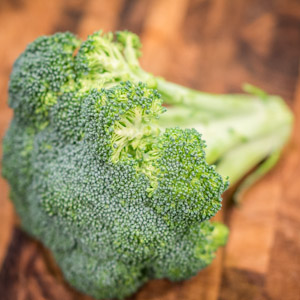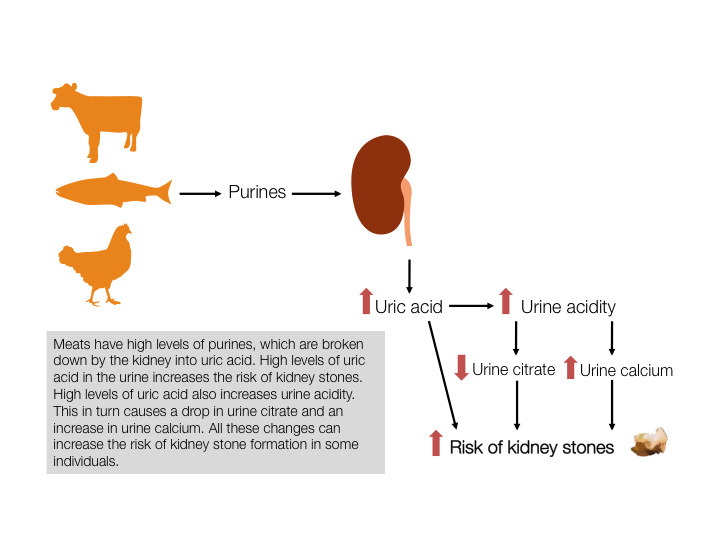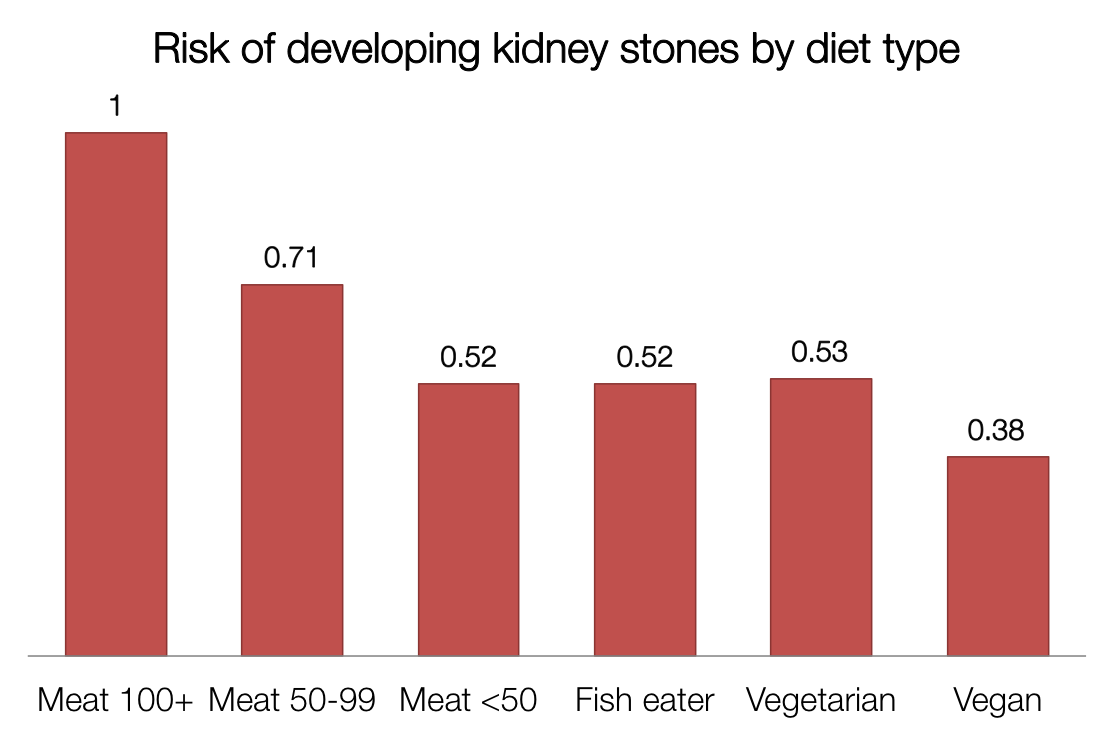 Earlier this year, a poll found that 7% of Americans identified themselves as vegetarians while an additional 6% were vegans.[1] Vegans, as you may know, in addition to not eating meat do not eat dairy products. Worldwide, the country with the highest levels of vegetarians is India, with 9% reporting being vegetarians and 31% reporting being vegan in a 2006. [2] One benefit of vegetarianism that often isn’t mentioned is enjoying a lower risk of developing kidney stones.
Earlier this year, a poll found that 7% of Americans identified themselves as vegetarians while an additional 6% were vegans.[1] Vegans, as you may know, in addition to not eating meat do not eat dairy products. Worldwide, the country with the highest levels of vegetarians is India, with 9% reporting being vegetarians and 31% reporting being vegan in a 2006. [2] One benefit of vegetarianism that often isn’t mentioned is enjoying a lower risk of developing kidney stones.
Meat intake can increase your risk of kidney stones. Meat contains high levels of protein, including a common food substance known as purine. Most other foods, including beer and some fruit and vegetables also contain purine but meat and seafood generally have the highest concentrations. Your body processes dietary purines into a waste product in the urine called uric acid. This results in a cascade of events which can increase your risk of kidney stones. First, uric acid itself is a stone promoter. It also increases your urinary acidity (lowers the pH). The increase in acidity then increases your urine calcium level and lowers your urine citrate level, which both also result in an increase in your risk of stones.
 So how much does eating meat actually increase your risk of stones? In a large study from the University of Oxford, Dr. Ben Turney and colleagues used data from a dietary survey of 50,617 individuals from the United Kingdom that intentionally included a large percentage of vegetarians and vegans.[3] 202 individuals developed a kidney stone episode during the study. The researchers looked at the type of diet an individual reported and their risk of kidney stones.
So how much does eating meat actually increase your risk of stones? In a large study from the University of Oxford, Dr. Ben Turney and colleagues used data from a dietary survey of 50,617 individuals from the United Kingdom that intentionally included a large percentage of vegetarians and vegans.[3] 202 individuals developed a kidney stone episode during the study. The researchers looked at the type of diet an individual reported and their risk of kidney stones.
Meat intake was classified into six categories: high meat eaters (>100 grams a day), moderate meat eaters (50-99 grams a day), low meat eaters (<50 grams a day), fish eaters, vegetarians, and vegans. What they found was that high and moderate meat eaters were at the greatest risk of developing kidney stones while low meat eaters, fish eaters, and vegetarians all cut their risk of developing a kidney stone by approximately a half. Vegans had an even lower risk of kidney stones. However, the authors note that because there were only 5 vegans in the study with kidney stones, the estimate for vegans may not be as accurate.
The risk numbers in the graph above indicate something called relative risk. If you are not familiar with this term, the concept can be explained this way: We decide to say that folks who have diets with the highest meat intake (100 grams or more a day) have a “reference” risk to which we assign the number 1. We then compare other diet types to this reference group. If the other diet types have a relative risk number greater than 1, they are at higher risk. If they have a relative risk number less than 1, they are at lower risk. A relative risk of 0.5 represents half the risk and a relative risk of 0.25 would represent one quarter of the risk.
The takeaway from this study is that if you’re a “kidneystoner”, cutting back on your meat intake can lower your risk of stones. The good news is that lowering your meat intake even moderately helps and lowering it more cuts your stone risk by half. In fact, having a low meat intake or eating primarily fish seems to be just as good as being a vegetarian from a stone formation viewpoint. For the truly hard core, becoming a vegan might result in having lowest risk of developing a stone.
We’d like to thank Dr. Turney for allowing us to use his data for this post. You can learn more about his work here at the website for the Oxford Stone Group.
References
1. Public policy polling, “Food Issues Polarizing America”, 2013
2. The Hindu, “Food Habits of a Nation”, 2006
3. Turney BW, et al. “Vegetarianism and Urolithiaisis”, presented at the American Urological Association Annual Meeting 2011.

The information presented in these annual meetings is often unrealiable and fails to make it through the peer review process. https://pubmed.ncbi.nlm.nih.gov/17085176/ Typical vegan bullshit. Siting what some “expert” have said instead of actual studies. Oh well, get yourself some creatine.
I had the same feeling, plus, all the comments are from vegan eaters claiming they had one or multiple incidents of kidney stones.
I am a vegetarian and have had stones. If you drink cranberry juice it help dissolve the stones so you can then pea them out. Turns your pea black but works
I am 40yrs . I feel back pain right side after ultrsno 3 stones in rght kidney size 0.6cm,0.5cm,1.03cm smaller two in out side kidney, and larger one inside right kidney. It is dected 12.10.2015,Now I am in china for higher studies but my course semester would finish 17 January, here treatment cost high than my country. my desire after semester go back my native country and then treatment.i feel sometimes pain. what can I do? though 3 months later treatment, please advise me.
I have 3 stones, one is in the left kidney by size 0.33cm and another tow are in the right kidney by size 0.34cm and 0.37cm. But the interesting thing is that I never get pain of it. An M.D. advises me not to worry about it and gives me an one month course of tab called “Cystone”. Now could plz tell me how shou I maintaine my diet? Becz im 27 and non-veg.
I’m vegetarian, rarely eat any dairy, am female 59 years old, but I keep developing calcium oxaxlate stones.
The information here is interesting. I’m hoping I can do something more to prevent getting more of these extremely painful stones.
hi 64 year old male ,i been have problems with kidney stones ,two years now ,every since i became a vegan to loose weight and join a program call C.H.I.P. coranary heart improvement program. my family doctor recommended to prevent heart attack or stroke. my urologist told me after experiencing kidney stone attack ,operation, and test to find more stones to change my diet,the whole vegan diet is my problem.some of my favorite veggie, legumes, nuts and fruits. so i am done with this diet or lifestyle.thank you
Wow this is the key folks. I have had over 20 calcium oxalate stones in 5 years. Also several lithotripsies/ureteroscopies. Became a vegan (well 90%), I still eat eggs and milk in baked goods…but point is… no stones since. I DID eat meat with very little caution. Iknow there can be other factors, but meat and sodium was my downfall, much more so than oxalates.
Mate, you can’t be eating baked good with dairy and eggs. It’s not true to the vegan diet and its just not overall good for you. You can look up vegan recipes online and I can promise there will be vegan baked goods that are just as tasty. But for the diet. Mainly, what you need to eat is fruit. Bananas, apples, blueberries, etc. Vegetables are good too but you must know that fruit should be more of the main part of the diet. I recommend diets high in bananas and oranges. I’d eat 20-25 bananas a day. I know it sounds crazy, but it literally is the healthiest thing to do. You can easily get 12 bananas blended with some berries in a smoothie and you’ll be pumped for the day after that. Your choice of course. If you like, I can assist you and send you some examples of what to eat on a vegan diet. I also may show you studies that support these claims. Stay healthy! Best regards, David
How’s your health now? More specifically, how’s your pancreas and liver?
I’ve been vegetarian for over 30 years, and had never heard of the word “oxalate” before Googling it after getting a kidney stone. It so happened that several of the foods I was eating daily in the months prior were very high in oxalates, especially Spinach, quinoa, amaranth, and peanuts. Spinach is outrageously high, and quinoa and amaranth are among the few foods as high. It was very easy, as a vegetarian, to just avoid a few very high oxalate count foods. I’ve started drinking more water, with a twist of lemon, which is good for breaking down any calcification of stones. Oddly, some six months after going to the emergency room, I urinated two stones today, about 1/8″ of an inch in size. From what I can tell looking at photos online, they are calcium oxalate stones. Good luck and good health to all.
Please read up if you are a vegetarian because even with an unprocessed diet, the staple protein sources for veggies all are high in oxalates. Nuts, eggs, beans, everything.
I have been feeling pains correspondent with kidney stones and have to get checked out. I am 30 and have been veggie since 13. I drink 2 cups of coffee a day and don’t eat processed foods every day. My protein intake is lower than should be and now I need to plan a proper diet.
i found a table of food groups broken down into levels of oxalate:
http://mydoctor.kaiserpermanente.org/ncal/Images/Dietary%20Changes%20to%20Prevent%20Calcium%20Oxalate%20Stones_tcm75-194243.pdf
in response to maggie
Calcium should not be avoided and the benefit of milk here is crucial. There is protein in dairy but low levels of purine, which breaks down into harmful uric acid
sum up:
water(duh), citrus
protein: peas, green beans, lima beans, lentils, coconuts, water chestnuts, cheese, yogurt, rice(white or wild)
My husband has been a vegetarian for 5 years and had multiple high oxalate kidney stones. After surgery, analysis of stones, and analysis of diet, it was determined that the high sodium vegetarian processed foods, high intake of peanuts, and high intake of dairy caused kidney stones.
Doctor advised to limit sodium intake, absolutely no peanuts, no processed vegetarian foods ( only organic, homemade vegetarian food), and to limit dairy. Organic only.
Also drink water every 30 minutes. Drink 3 liters of water a day. During summer, drink 6 liters of water due to hot weather. No soda. No caffeine or coffee. Stay away from artificial sugar, such as sweet n low.
This doctor is working to crack the kidney stone code. He believes kidney stones results from diet. ( All processed foods have a lot of sodium (salt) and kidney stones love salt ). You much also eat small portions and in moderation.
Doctor, who is a meat eater, said that the vegetarian diet is excellent but my husband needs to see a vegetarian nutritionist. And remember, WATER IS YOUR BEST FRIEND. STAY HYDRATED MY FRIEND.
I have kidney stones. They have bee napped 4 times all ready. Last time was Jan 9th 2015. I a told I might have to have it again the 12th. I have to go for another spec. Drag and brings it right to his office so he can see it right away. I think this will make up his mind up what to do. My stone he is upset about 8 milligrams doesn’t think I can pass it. What do you think do..is wrong. Can you explain to me how large 8 millimeters are inches.
I hope you can help me. I have kidney stones and have been zapped 4 times the last time was on the18 or so is Jan. I’m. Going for my check up Wed. Now I find up from the hospital. That the doc. Arranged another one on the 12th. The doctors nurse called me from my doctors office I have to go to the his and have a special test and bring it directly to his office the same day. Can you help me what is going on. We never mentioned another zapping when I saw him.
I’m a vegetarian and have passed 2 stones since becoming one, so yes it can happen regardless of diet.
My 91 yr old Mom has a kidney stone about a centimeter in size. Her urologist recommends shock wave ESWL treatment & told her some women compare pain from passing stone fragments, to child birth. She also takes anti-seisure meds for brain surgery couple of yrs ago & has a pacemaker & I hate to think of her experiencing pain comparable to child birth at her age with these other problems.
Wouldn’t it be a better bet for less pain to have the Ureteroscopy treatment?
If your urologist/ nephrologist is recommending the ESWL it is probably bc he or she believes this treatment to be the best option. Sometimes stones are too large to be removed through ureteroscopy and the shock wave treatment can break up larger stones into smaller pieces which can then be removed through the minimally invasive scope technique. I’m sure your dr is trying to find the best combination of treatments for your mother while attempting to avoid any drastic measures. Percutaneous surgery would also be an option for your mom, but again, this is much more invasive and depending on your mom’s health could be a risk. My reccomendation? ASK YOUR MOM’s DOC! Don’t be afraid to make a list of questions and concerns. If the Dr doesn’t seem receptive or willing to take the time, find a new one!